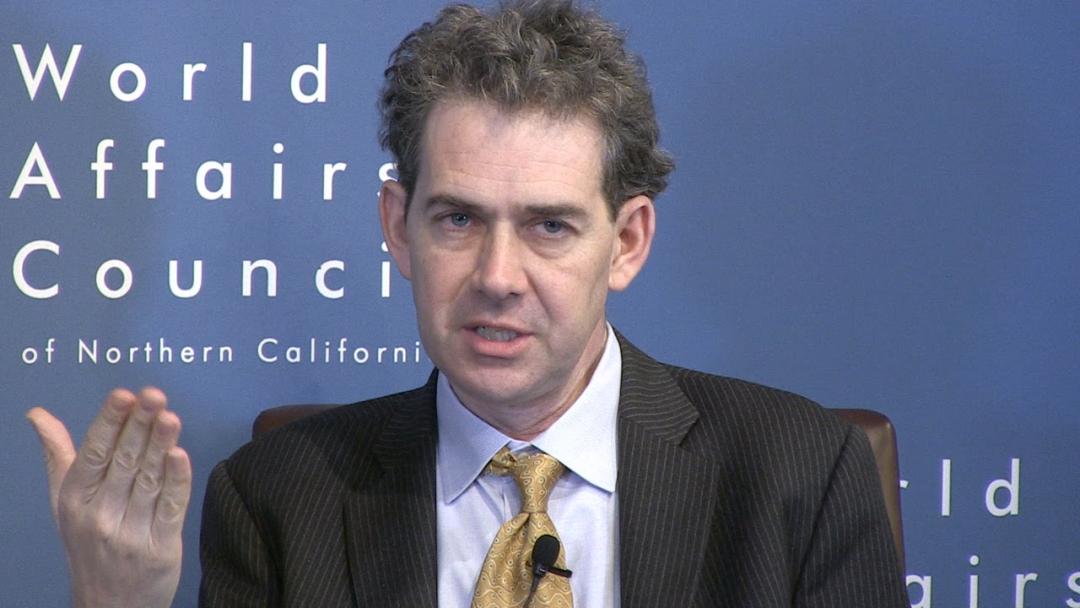
De Waal Discusses Armenia's Challenging Geopolitical Position and Future Prospects in 2024

In an interview with the RFE/RL Armenian Service, Thomas de Waal, an expert on the Nagorno-Karabakh conflict and a senior analyst at the Carnegie Foundation, emphasized that Zangezur is a crucial route for both north-south and east-west directions.
“Who would have believed a few years ago that you would see flags of the European Union and Iran in Kapan, Armenia, that the French would like to open a consulate there, that the Russians are there, and that suddenly this will become the center of international competition and diplomacy, as it was in 1919 and 1920? But it’s happening again. And why is this happening? Well, it’s a crucial route for both north-south and east-west directions. Julfa in Nakhichevan was a Soviet-Iranian railway border crossing point, it was a big border crossing point. And, of course, it was closed, and no trains have passed through it for 30 years,” said the analyst.
If the railway through Armenia's Syunik Province and Zangezur is reconstructed, Julfa would regain its status as the railway crossing point between Russia and Iran. This has renewed interest in the region from Russia and Iran. For Azerbaijan, the importance lies in the connection with Turkey. At the same time, for the West, it represents a new East-West channel stretching from Turkey through Armenia, and Azerbaijan to Central Asia. According to Thomas de Waal, the compact 43-kilometer railway has suddenly become a focal point of interest for various stakeholders. Additionally, with the closure of East-West connections due to the war in Ukraine, the significance of East-North-South channels in the Caucasus has increased. De Waal speculated that this shift in importance is why the attention of various actors is now directed towards this small region in southern Armenia.
“Undoubtedly, this is a very crucial, important, somewhat dangerous moment for Armenia in 2024. The country faces perhaps the most difficult choices, comparable to the situation in the late 1980s or even the 1920s. Of course, it is about the loss of Karabakh and the fleeing of the Armenian population from there. This is a serious moment for Armenia, which some compare with the Genocide of 1920 or even 1915. This will also be the year when Armenia will face not only the threat from Azerbaijan but also the threat of losing or severing relations with Russia. Thus, in 2024, many challenges await Armenia without a doubt,” de Waal noted.
In response to a question about whether the EU or individual EU member countries would be willing to make substantial investments and provide military equipment to enhance the capabilities of the Armenian Armed Forces, the analyst expressed belief in political, diplomatic, and, to some extent, economic interest. However, regarding security, there are doubts that the EU or NATO would invest in Armenia’s armed forces due to its membership in the Collective Security Treaty Organization. The analyst speculated that perhaps France might take some actions at a bilateral level, but he emphasized that this would be a prolonged process. Looking ahead, he believes Armenia holds promising prospects in the long term. As a democratic country with a well-educated population, he anticipates positive developments for Armenia in the future.
“The prospects for Armenia may be good. But it’s in the longer term. In the short term, however, if we consider the year 2024, a lot may not be the case in Syunik Province when Russia may be trying to destabilize Armenian PM Nikol Pashinyan’s rule. And what the West can offer is unfortunately more long-term, not so short-term,” he added.
In response to a question about whether Russia remains highly interested in destabilizing and potentially overthrowing Pashinyan’s government to bring individuals loyal to Moscow, Thomas de Waal expressed the belief that Russia indeed desires such a scenario. However, he suggested that Pashinyan might be aided by the fact that, while he may be unpopular, Russia is even more unpopular. According to de Waal, this might be the factor currently preserving Pashinyan’s hold on power.
In response to the assertion that many Armenians feel abandoned and betrayed by Russia, Thomas de Waal acknowledged that Russia has consistently held significant interests in the region. While stronger ties may have existed with Armenia, relations with Azerbaijan were never completely abandoned. De Waal highlighted historical instances, such as 1990 and 1991, when Moscow had closer ties with Baku during the Karabakh conflict.
He emphasized that Russia prioritizes its interests, placing them above religious or historical affiliations. However, Moscow remains a crucial guarantor of Armenia’s security due to Russia's military alliance and obligations towards Armenia.
Regarding the de-Armenization of Karabakh, de Waal noted that it is, unfortunately, the consequence of wrong actions by politicians from both Azerbaijan and Armenia over the years, driven by a maximalist approach. De Waal pointed to a specific moment in 2019. He referred to Azerbaijani President Ilham Aliyev appearing in military attire, accompanied by scenes of celebration in Stepanakert. Concurrently, in 2019, Armenian PM Nikol Pashinyan delivered a speech at the same square declaring, "Artsakh is Armenia, and that's it!" De Waal believes this moment marked Azerbaijan's shift away from diplomacy and compromises, leading to war.
Thomas de Waal also expressed a degree of skepticism about the peace agreement. He referred to a well-known statistic in conflictology indicating that more than half of peace agreements fail within five years, particularly emphasizing the challenges associated with multifaceted peace agreements. According to de Waal, the success of such agreements involves not only the signing but also the aspect of implementation.
See Also


Mirzoyan Meets US Deputy Assistant Secretary Joshua Huck

Azerbaijani President Holds Talks with UAE and German Business Delegations on Economic Cooperation

Grigoryan Confirms Armenia’s Readiness to Dissolve OSCE Minsk Group Upon Peace Treaty Signing

Azerbaijani Official Warns of Ecological Risks to Caspian Sea, Similar to Lake Urmia and Aral Sea

